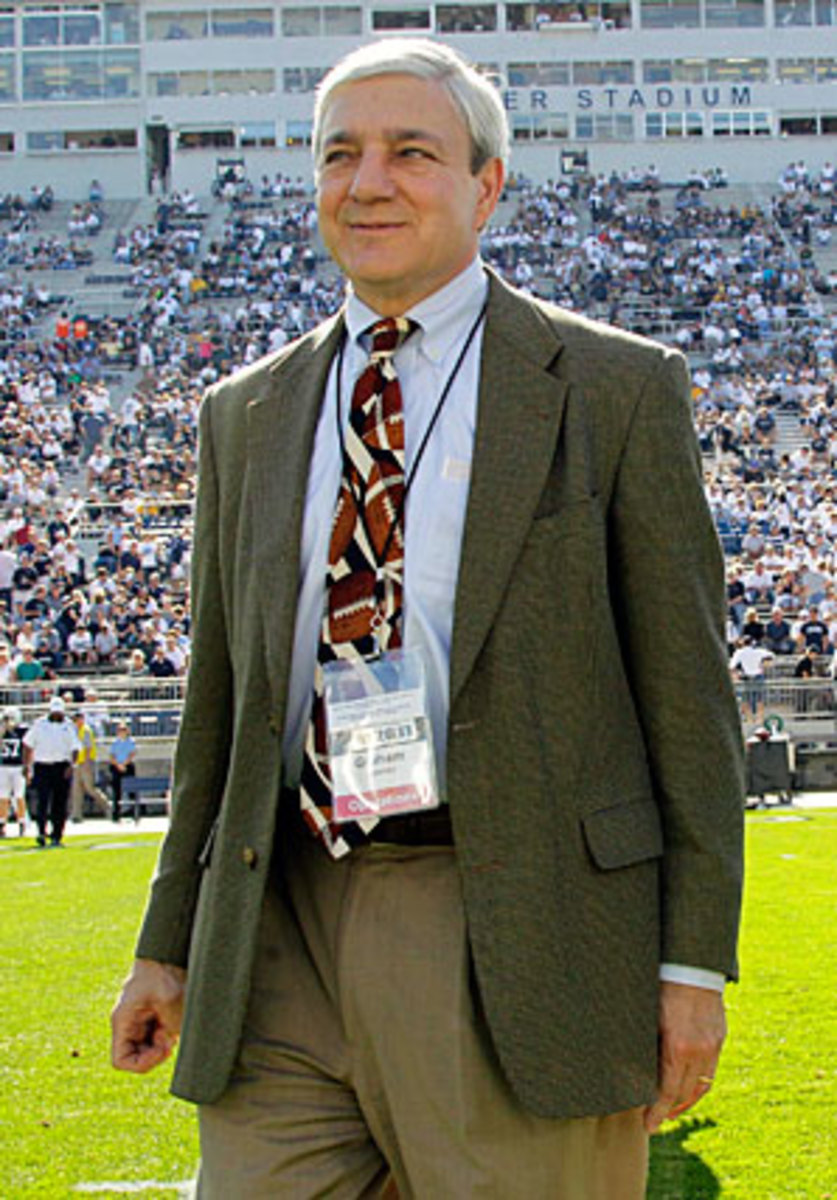Charges against Graham Spanier key to proving Sandusky cover-up
Don't lie. Pretty simple, right? It's one of the most important lessons we learn as children. But we all do it, because we think the truth is hurtful ("you look great today"), out of convenience ("I'm sorry I'm late -- traffic was terrible"), desperation ("I didn't realize the speed limit was 35, officer") or out of ambition ("my résumé would look snazzier if I write that I graduated magna cum laude from Princeton at age 11. Now how do you spell 'magna'?")
There are small lies, white lies, and occasionally enormous whoppers of lies. Thursday afternoon in Pennsylvania, a man named Graham Spanier was indicted for something else: a rubber-band ball full of lies.
Did you ever make those rubber-band balls as a kid? You just wrap one rubber band over another -- getting started is the hardest part -- until they are the size of a marble, a golf ball and then a tennis ball. It gets to the point where you have no idea how many rubber bands you used, and you can't see the first one.
That is what Spanier is accused of doing in the Jerry Sandusky case. Spanier was Penn State's president. He was fired when the Sandusky sex-abuse allegations exploded nearly a year ago. Spanier is accused of lying a little bit more than a decade ago, then lying again, and again, one rubber band on top of the other, until there was an enormous ball of lies sitting in front of him.
How does this happen? Well, we don't know for sure that it did -- he will have his day in court. But if we want to understand why Pennsylvania attorney general Linda Kelly is going after Spanier and fellow administrators Tim Curley and Gary Schultz, I think it's best to start with the rubber bands on the outside. Those were, allegedly, the final layers of lies. Peel them off, and maybe we can get to the core.
*****
Spanier was indicted on eight charges Thursday. Some of them get your blood flowing: perjury, endangering the welfare of children, failure to report allegations of abuse, conspiracy. Crime novels and blockbuster movies have been built around any one of those allegations. But the one that stood out to me is obstruction of justice. If the attorney general is right, then the final layer of lies starts there.
"Subpoenas were not complied with," Kelly said in a news conference announcing the charges. "Very little of significance was provided to the grand jury until the Nov. 9, 2011 termination of Graham Spanier."
Subpoenas were not complied with.
Perjury is notoriously difficult to prove. It is not just about lying. Prosecutors must prove the perjurer knowingly lied about something important. It can't be an accident, forgetfulness or because of blunt trauma to the head.
And that is where those subpoenas come in. If Spanier and underlings Tim Curley and Gary Schultz really believed they had done nothing wrong, why wouldn't they comply with subpoenas? If you were a juror, wouldn't that make you suspicious?
And if you were an attorney general, wouldn't that make you mad? And really suspicious?
Very little of significance was provided to the grand jury until the Nov. 9, 2011 termination of Graham Spanier.
Well, obviously Kelly would only say that for one reason: Very MUCH of significance was discovered AFTER the termination of Graham Spanier.
Peel off those last two rubber bands and the whole ball starts to unravel.
Kelly is not running for re-election. But she thinks the state can prove that these men knowingly and intentionally lied. And if the state can show that Penn State suppressed evidence and failed to comply with subpoenas ... well, that makes the more famous allegations, of covering up for Sandusky many years ago, much more believable.
The trial will surely feature some small surprises and perhaps some enormous ones. But at heart, we probably have a pretty good feel for what each side will try to say. Prosecutors will say Spanier, Curley and Schultz intentionally hid Sandusky's crimes, first to protect the institution and then to protect themselves.
The defendants will say no, that's not true. They will argue they never saw clear evidence of Sandusky's crimes. They will say Sandusky was a pathological liar and sexual predator who fooled thousands of people, not just them.
So much of what the attorney general said Thursday is old news -- extremely relevant, but well-known. She said Penn State administrators "did not meet with McQueary until over a week after the 2001 incident occurred." She said in e-mails, Curley was "seemingly using words to try to mask the true topic of the e-mail." She said he referred to the 1998 investigation of Sandusky as the "first situation" and victims as "guests."
This is all important. It is the core of the scandal. But it is hard to prove a crime based on e-mails that were intentionally vague. Kelly made it clear Thursday that she thinks she has more than that. There is an old saying, most commonly associated with Watergate, that the cover-up is worse than the crime. In this case, the cover-up may prove the crime happened.






